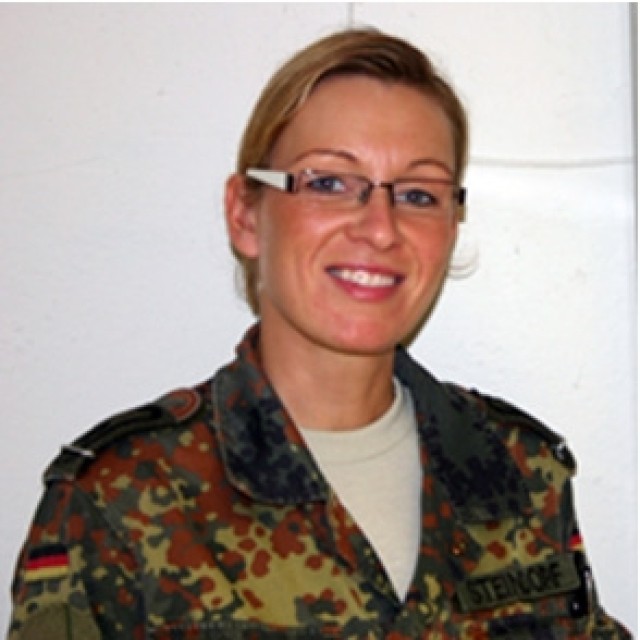SCHWEINFURT, Germany -- The quest for knowledge and experience in the military crosses national borders and recognizes all uniforms. Sometimes that quest translates into theater security cooperation at the most elemental scale, making U.S. Army Europe and NATO a little bit better, one Soldier at a time.
Nadine Steindorf and Fabian Rasch, warrant officer cadets in the German air force and army, respectively, are training with U.S. Army Europe's 172nd Separate Infantry Brigade as the brigade prepares to deploy to Iraq.
"We're here to support the allies. If that's what they want us to do, they can come here to train with us," said Michael Cormier, the 172nd's partnership officer.
Cormier, who has known Rasch for several years, took a request from the infantryman last year.
"When he became a cadet, he asked me if it would be possible to do an on-the-job training (visit) here in Schweinfurt, either at the brigade or one of the battalions," Cormier said.
"My intention was to increase my speaking knowledge for operations, because the NATO standard operating language is English," said Rasch, who has been spending his four-week stint with the brigade's 2nd Battalion, 1st Infantry.
Steindorf, who spent a year training at Fort Bliss, Texas, echoed Rasch's sentiments about serving with other nations' militaries -- and practicing English.
"It's one of the most important parts of the German military to work with different nations," she said. "I know my job in the German air force, and I want to get more experience."
Steindorf is spending two weeks in Grafenwoehr with the 1st Battalion, 77th Field Artillery, following two weeks with the unit in Schweinfurt.
"I want to get the experience of how the Americans work," she said.
Rasch has focused his interest on the preparations Soldiers and units undertake before a deployment, as well as learning from the experiences of combat-tested American Soldiers.
"They just came back and are very experienced, and they know pretty much what is going on, and it is good to see how it works," Rasch said. "They're pretty young and have much more experience than a 21-year-old German soldier."
Both American and German militaries take something valuable from such exchange programs, Cormier said.
"I think the benefit is for both. He (Rasch) gets his hands wet on interoperability training to see how the U.S. Army functions getting ready to a major exercise (and then deploying to) Iraq.
And the U.S. Soldiers just get the benefit of having a NATO ally training with them. I mean, it's joint."
The opportunity is not lost on Steindorf and Rasch.
"I'm living it for four weeks, and that's more than any lesson can give me. You can learn everything, but you can't feel it. So I learn a lot just by talking to corporals, to sergeants," Rasch said.


Social Sharing